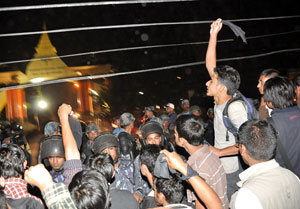 BIKRAM RAI |
After three days of marathon diplomacy in the Indian capital, Prime Minister Baburam Bhattarai returned home with Indian goodwill, only to be greeted at the airport with bad will from his fellow comrades.
Bhattarai exuded confidence, but where does it come from? He couldn't have cared less about the black flags at the airport gate. "I expected this, he told the press, "but it needed to be done because it is in the interest of the nation."
Beyond the rhetoric and polemic, the India visit was a refreshing departure from previous ones. For the first time, the two countries issued a joint statement agreeing to review and revise the 1950 treaty which will provide a window of opportunity for Nepal to establish ties with its southern neighbour on an equal footing. While the Indian side is known to be very sensitive about its security concerns, the Nepali side also secured Indian commitment not to allow its land to be used against its neighbour.
Bhattarai's statement that Indian security cannot be addressed in isolation reflects that Indo-Nepal relationship has gone through a paradigm shift.
Not long ago, during the war, the Indian government looked the other way while Nepal's Maoists went in and out of Delhi. Then, when they won the election and Pushpa Kamal Dahal became prime minister they became conspicuously and overtly "anti-Maoist". So much so that its ambassador made blatantly provocative statements and was in turn greeted with shoe projectiles. Both the Maoists and the Indians tried to play each other down. While Delhi tried to assert its presence in Nepali politics ignoring the changing ground realities, for their part the Maoists overlooked the changed geopolitical context of their revolution.
If the deal in New Delhi last week is anything to go by, both sides seemed to have learned their lessons. The $250 million line of credit is an indication that India is ready to ratchet up its economic involvement in Nepal. This is strategic: a poor and chronically unstable Nepal is not in India's national interest. New Delhi has decided to help Baburam Bhattarai try to be the architect of Nepal's economic transformation by encouraging investment, creating jobs.
Why should Nepalis be against that? They aren't. It is only Bhattarai's enemies within his own party who are against it because they are against him. The knee-jerk reaction to the BIPPA agreement is another manifestation of bankrupt nationalism from hardline Maoists as well as the confused UML.
UML leaders are so vacuous they haven't even bothered to elucidate what exactly it is they don't like about BIPPA. Maoist ultra Mohan Baidya has made a complete fool out of himself by stating that it is quite normal for industries to be destroyed and shut down and that the government can't take responsibility.
Mercifully, Tihar came in the way and the media went into hibernation so these rants didn't get wider play. The government has guaranteed safety of Indian investors, something it has done for investment from other countries, and it is fulfilling its obligation to ensure economic growth by assuring outsiders that their investment in Nepal is safe.
Although the state also has an obligation to guarantee domestic investors similar safeguards, consistent economic underdevelopment along with technological lag means that Nepal's resource and energy drained economy urgently needs injection of foreign capital to rescue it from stagnation.
Nepal also competes with countries with low wages but much more attractive political, energy and labour situations. We need to generate enough power so that industries don't shut down and workers are not laid off due to losses incurred as a result of underproduction. Nepal does not have that kind of money now, it needs the outside world.
And that is probably where Bhattarai's confidence comes from: as a PhD he understands this on an academic level and knows that politically BIPPA was the only way to go. Those that don't agree must either come up with a better alternative, or not be spoilers.
Read also:
The power of Nepal's man power, EDITORIAL
Turning guns to pens, JYOTI MALHOTRA
Economics trumps politics in India-Nepal relations for the first time



